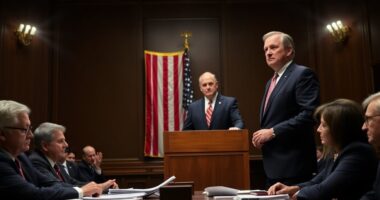You might've noticed the recent dip in Bitcoin's value following Trump's Strategic Reserve Order. Initially, investors felt hopeful about the government's involvement. However, as time passed, worries about centralized control began to emerge. Could this government intervention actually backfire and lead to greater volatility? The implications for the cryptocurrency market are complex, and the balance between innovation and stability is more fragile than ever. What does this mean for the future?

As the U.S. government establishes the Strategic Bitcoin Reserve through a new executive order, concerns are rising about its impact on the cryptocurrency market, particularly Bitcoin's value. This move, which centralizes digital asset management under the Treasury and Commerce departments, aims to create a structured approach to handling seized digital assets. The government's current holdings of around 200,000 bitcoins raise questions about how this reserve will affect market dynamics, especially given the cryptocurrency's notorious volatility.
Initially, the announcement sparked a rally in crypto markets, creating an optimistic outlook among investors. However, that enthusiasm quickly shifted to apprehension as experts began to voice concerns about the long-term implications of the reserve. You might wonder if this strategic reserve will genuinely stabilize Bitcoin's value or if it could inadvertently contribute to a decline.
With Bitcoin's price fluctuations often swayed by market sentiment, the introduction of a large government reserve could lead to misjudgments and unexpected market reactions. The U.S. intends for the Strategic Bitcoin Reserve to serve as a long-term store of value, which means the government won't be selling off these assets anytime soon. This strategy could affect Bitcoin's supply dynamics, potentially leading to price pressure. Furthermore, the reserve will involve federal purchases of Bitcoin, Ethereum, and other cryptocurrencies, which may cause further shifts in market sentiment.
While the initiative avoids taxpayer funding, relying instead on assets seized through forfeiture, the inherent risks of cryptocurrency volatility remain. As the federal government steps into the crypto space, the potential for market instability looms large. Moreover, the broader economic implications can't be ignored. The establishment of a strategic reserve might impact the dollar's global standing, raising concerns about its stability in the face of increasing cryptocurrency adoption.
As the U.S. aims to position itself as a leader in the crypto world, the regulatory environment continues to shift favorably. Still, the fears surrounding volatility and scams persist, with experts questioning whether the government's approach is sustainable.
In essence, while the formation of the Strategic Bitcoin Reserve reflects a significant pro-crypto policy shift, it brings with it a host of uncertainties. As you navigate this evolving landscape, it's crucial to remain aware of how government actions might influence Bitcoin's value. The balance between fostering innovation and maintaining market stability will be a delicate one, and the long-term consequences of this initiative are yet to be fully realized.









